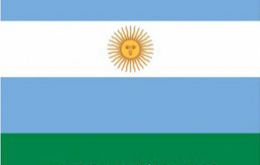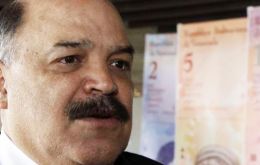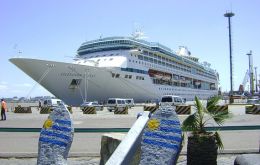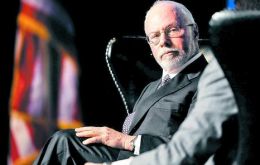MercoPress. South Atlantic News Agency
Economy
-
Tuesday, April 23rd 2013 - 02:09 UTC
Argentina and Brazil private sectors team up to promote exports to Arab countries

With the intention of boosting exports to Arab nations, the Argentine and Brazilian chambers of commerce have established an Arab-South American Commerce Federation it was reported in Buenos Aires.
-
Monday, April 22nd 2013 - 07:43 UTC
Mathematician will be responsible for putting Venezuelan inflation back on its feet

President Nicolas Maduro replaced Venezuelan Finance Minister Jorge Giordani, appointing central bank chief Nelson Merentes in his place two days after being sworn in as Hugo Chavez's successor.
-
Saturday, April 20th 2013 - 09:07 UTC
Uruguay investing hundreds of millions to support the US dollar and exports edge

Uruguay’ financial and political stability is backfiring as the Central bank is forced to buy a massive inflow of foreign capital which in turn creates an abundance of Pesos that need to be absorbed to control inflation and support the competitive edge of the country’s exports.
-
Saturday, April 20th 2013 - 09:01 UTC
Positive cruise season for Uruguay and further growth prospects for 2013/14

Last Wednesday April 17 ‘Splendour of the Seas’ and its 1.940 passengers marked the end of the 2012/13 cruise season for Uruguay, which took off on 23 October and totalled 222 calls between the port of Montevideo and Punta del Este sea resort.
-
Saturday, April 20th 2013 - 08:56 UTC
Fitch trims UK top credit rating on weaker economy and fiscal outlook

Britain's credit standing took a further blow when Fitch Ratings became the second major international agency to strip the country of its top-notch credit rating. The move is an embarrassment for the Conservative-led government which promised to protect the country's rating when it took power in 2010, and will heighten the debate about whether austerity is still the right approach.
-
Saturday, April 20th 2013 - 08:39 UTC
US hedge funds reject Argentina’s offer to settle defaulted sovereign bonds suit

Two US hedge funds suing Argentina for full payment on defaulted bonds rejected on Friday, President Cristina Fernandez government offer to settle the suit with a deal that would give them approximately 25% of what they were seeking.
-
Saturday, April 20th 2013 - 08:32 UTC
Argentines expecting inflation above 30% for the next twelve months

Argentines are expecting an inflation of 34.2% in the coming twelve months according to the average from a monthly report released by a prestigious private university research centre based on surveys,
-
Saturday, April 20th 2013 - 06:26 UTC
IMF again warns Argentina: new inflation index “is not enough”

Argentina's new inflation measure is not enough to overcome the International Monetary Fund's censure of the country for inadequate data, an IMF official said Friday.
-
Saturday, April 20th 2013 - 06:08 UTC
Embraer-Augusta Westland project to build helicopters in Brazil falls through

Brazilian plane maker Embraer SA said on Friday that it ended talks with AgustaWestland, a subsidiary of Italy's Finmeccanica, without reaching an agreement to form a joint venture.
-
Saturday, April 20th 2013 - 05:56 UTC
Brazil slams US and Europe for delaying promised reforms in the IMF

Brazil’s Finance Minister Guido Mantega slammed the United States and Europe for repeatedly delaying reforms of their dominated shareholding and voting power in the International Monetary Fund (IMF).
